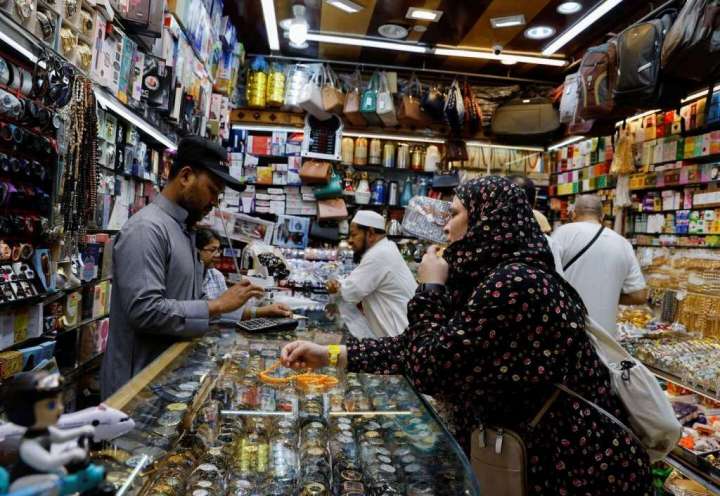BEIRUT — As prices of basic commodities balloon around the world, Saudi Arabia and the United Arab Emirates — which have both benefited massively from the spike in energy prices — have allotted billions of dollars in new spending to shield their citizens from the rising prices.
Wealthy Mideast nations boost spending to protect citizens from inflation

Gulf citizens had long been accustomed to lavish social perks from their governments, which have historically shielded them from financial pain. In recent years, though, both the UAE and Saudi Arabia, the gulf’s two largest economies, have been working on weaning citizens off of their reliance on the state.
However, as the effect of the pandemic and Russia’s invasion take a toll on the daily cost of living in the gulf countries, the two governments have loosened their purse strings to soften the blow on their low-income nationals.
The UAE announced on Monday it plans to double its budget for financial support offered to low-income Emirati families, allocating $7.6 billion, while Saudi Arabia’s King Salman announced a $5.33 billion allocation for direct cash transfers and stockpiling of key commodities.
“I think these two announcements are really more about just a recognition that the government is making a lot of money,” said Karen Young, senior fellow and director of the Program on Economics and Energy at the Middle East Institute.
“There’s really high oil revenue. So you have to make some sort of concession or admission that the government has more discretionary spending, and so they have to make it apparent that they are willing to spend on people that need it,” she added.
Gasoline prices in the UAE, for instance, have doubled over the past few months — the first sharp increase since the UAE deregulated fuel in 2015.
To ease this effect on low-income citizens, the government announced it will cover 85 percent of the rise in gas costs above a specific price, as well as 75 percent of inflation on food items, among other measures.
The benefits will not extend to non-Emirati families and individuals, who make up the vast majority of the country’s population but have very little power in the autocratic nation of nearly 10 million. Emirati citizens are only 10 percent of the population.
In Saudi Arabia, where citizens make up two-thirds of the 35 million people, a bit more than half of the financial bundle will be distributed as direct cash transfers to social security beneficiaries. This includes small livestock breeders and those registered with the Citizens Account, a program set up in 2017 to ease the effect of austerity measures. Registration for the program will also be reopened.
In May, the price of meat, fish, fruits, vegetables, oils and fats in the kingdom went up 20.7 percent compared with the same time last year, the Saudi General Authority for Statistics said last month.
While the prices of food were already high in the gulf, they do not make up as big a proportion of family budgets when compared with the rest of the region, where inflation has been crushing, Young said. Prices in the gulf are increasing but not escalating at a high rate. “So the inflationary pressure in the gulf is more muted than what we see” across the Middle East and North Africa.
“The general trend in Saudi Arabia is actually cutting relief,” Young said. “Social support has generally been declining. So fewer people receive the Citizens Account benefit than they did two years ago.”
Over the past six years, Saudi Arabia introduced painful austerity measures to lessen the financial weight on the historically generous welfare state that the government can no longer afford as the population rises. It has moved toward broader liberalization and fewer subsidies, making it more difficult for citizens to rely on the state.
“Those days are over,” Young said. “But it also makes sense right now to show some support.”
In a news conference on Tuesday, Saudi Minister of Commerce Majid al-Kassabi struck a sympathetic tone. “We are meeting today,” he said, “to discuss an important matter, a matter that has touched every family and every household, one from which the whole world suffers from, which is the rise in prices: inflation.”
He emphasized the kingdom’s efforts to crack down on price manipulations, calling on citizens to phone in any such efforts. He evaded giving direct answers to questions from reporters about adding more items to the government subsidy list if prices continued to rise and how a further financial fallout from Ukraine’s war would be addressed.
Kassabi repeatedly emphasized that Saudi Arabia was not unique in its malaise: The pandemic and “repercussions of global events” have interrupted shipping routes and raised transportation costs, sparking inflation worldwide.
Saudi Arabia’s inflation levels are the highest in 22 months, wrote David Owen, economist at S&P Global Market Intelligence. In a release published Tuesday, Owen said businesses are registering the fastest rise in costs since August 2020, and “one of the most marked in the last eight years.”
However, Saudi Arabia’s non-oil private sector expanded last month at its fastest pace in seven months, Owen noted, with an increase in exports and foreign demand, despite concerns by companies about the sustained price rises.
“They’re sitting on a lot of cash,” said Young, “so it makes sense to signal to the population that we’re willing to share a bit of this, we’re in a good period, but we’re not willing to completely backtrack on what we think is an important reform process.”






